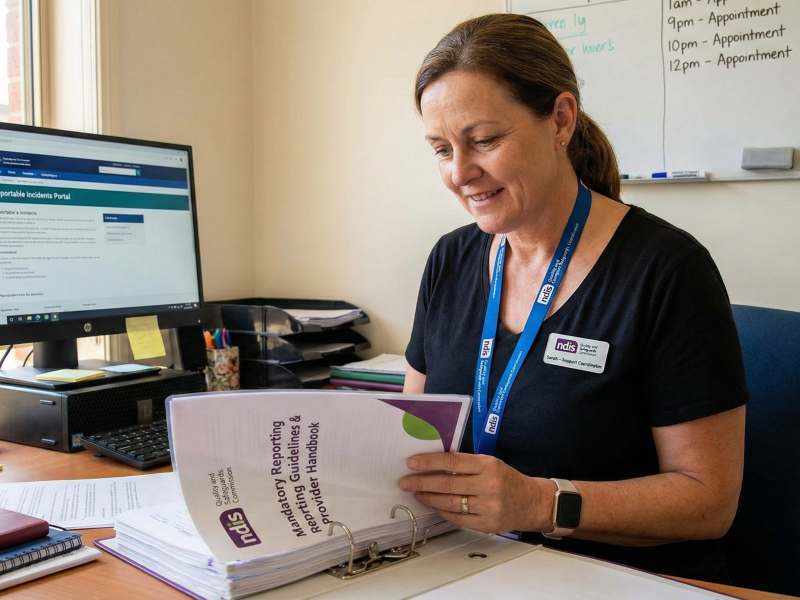In Australia’s National Disability Insurance Scheme (NDIS), Providers can be classified as either Registered or Unregistered. The distinction plays a significant role in determining which Participants a Provider can support, what compliance obligations they must meet, and the types of NDIS funding they can access. Understanding the difference between Registered and unregistered NDIS Providers is essential when deciding the most suitable path for your business, whether you are just starting out or considering a change in Registration status.
What is a Registered NDIS Provider?
An NDIS Registered Provider is a business that has completed the Registration process with the NDIS Quality and Safeguards Commission. This process requires Applicant Providers to meet strict criteria, including compliance with the NDIS Practice Standards, worker screening checks, and passing an audit conducted by an approved quality auditor.
Registered Providers are authorised to deliver supports to all NDIS Participants, including those who are plan-managed, self-managed, or NDIA-managed. They can also claim payments directly through the NDIS portal, making the payment process more efficient and reliable.
Want to Attract More NDIS Clients?
Get expert advice on how to market your services, connect with clients, and grow your practice.
What is an Unregistered NDIS Provider?
An unregistered NDIS Provider is an individual or organisation that has not completed the Registration process with the NDIS Quality and Safeguards Commission. While they are not formally recognised by the Commission, they are still able to deliver supports to Participants who have plan-managed or self-managed NDIS plans.
unregistered Providers are not required to comply with the NDIS Practice Standards, but they are still expected to offer high-quality, safe, and ethical services. Unlike Registered Providers, they cannot claim payments through the NDIS portal and must manage their own invoicing directly with clients or plan managers.
Key Differences Between Registered and unregistered NDIS Providers
Feature | Registered Provider | Unregistered Provider |
|---|---|---|
Access to Participants | All NDIS Participants, including those that are NDIA-managed | Only self-managed and plan-managed Participants |
Payment | Directly through the NDIS portal | Paid by Participant; reimbursement managed by Participant |
Regulatory Requirements | Must comply with NDIS Practice Standards and undergo audits | Optional to comply with the NDIS Practice Standards but is strongly encouraged |
Service Types | Can provide all service types, including high-risk supports | Restricted to services that do not need Registration – cannot deliver Specialist Disability Accommodation, Plan Management or Positive Behaviour Support services |
Market Access | Eligible for NDIA referrals and government contracts | Restricted marketing through informal networks |
Advantages of Being a Registered NDIS Provider
Broader Access to Clients
Registered NDIS Providers are authorised to deliver services to all NDIS Participants, including those with NDIA-managed, plan-managed, and self-managed plans. This broadens the potential client base and opens up more consistent service opportunities.
Enhanced Credibility and Participant Trust
Registration with the NDIS Quality and Safeguards Commission demonstrates that your business meets national standards for safety, quality, and compliance. This builds trust and strengthens your reputation among Participants, families, and support coordinators.
Streamlined Payment Processing
Registered Providers can claim payments directly through the NDIS portal. This reduces administrative workload, improves cash flow, and ensures timely reimbursement for services delivered.
Access to Government Opportunities
Being a Registered NDIS Provider allows access to government contracts, public sector tenders, and formal partnership opportunities that require official Registration and compliance with NDIS Practice Standards.
Referrals Start With Reputation – We’ll Help You Build Both
From networking tips to service refinement, we guide NDIS providers toward lasting impact.
Challenges of being an Unregistered NDIS Provider
Limited Access to Participants
unregistered NDIS Providers can only offer services to Participants with self-managed or plan-managed funding. This means NDIA-managed Participants cannot engage your services, reducing your potential client base.
Greater Administrative Responsibility
Without access to the NDIS portal, unregistered Providers must invoice clients or plan managers directly. This can lead to delays in payment and added administrative tasks for both the Provider and the Participant.
Lower Online Visibility
unregistered Providers are not listed on the official NDIS Provider Finder tool. This limits your visibility and makes it harder for potential clients to discover your services through NDIS channels.
Fewer Growth Opportunities
unregistered status may exclude you from government-funded projects, formal partnerships, and other opportunities that require NDIS Registration. This can restrict your ability to scale and grow within the disability services sector.
Who Should Choose to Be a Registered NDIS Provider?
Becoming a Registered NDIS Provider is essential if you plan to deliver high-risk or specialised supports such as Behaviour Support, Specialised Disability Accommodation, or Plan Management. Registration is also the preferred option for businesses aiming to grow, apply for government contracts, or provide services to a wider range of Participants, including those with NDIA-managed plans. Although the Registration process requires time, financial investment, and detailed paperwork, the long-term benefits such as greater credibility, increased client access, and broader funding opportunities often make the effort worthwhile.
Can You Switch from unregistered to Registered NDIS Provider?
Yes, it is possible to transition from being an unregistered to a Registered NDIS Provider. The process involves submitting an application through the NDIS Commission portal, completing a self-assessment against the relevant NDIS Practice Standards, and undergoing an audit by an approved quality auditor. Once your Registration is approved, you will gain access to a larger pool of Participants, including those with NDIA-managed plans, and the ability to offer a broader range of supports. While the transition may take several months to complete, many Providers find that the long-term advantages of Registration make the process worthwhile.
Conclusion: Which NDIS Provider Type is Right for Your Business?
Choosing between becoming a Registered or unregistered NDIS Provider depends on your services, goals, and operational capacity. Registered NDIS Providers benefit from broader access to Participants, increased trust, and the potential to grow through government contracts and formal networks. However, Registration also comes with ongoing compliance requirements, audits, and additional administrative responsibilities. unregistered Providers enjoy more flexibility and fewer regulatory obligations but have limited access to NDIA-managed Participants and fewer opportunities for large-scale growth. It is important to assess your business model, available resources, and long-term vision carefully to determine the best path for your NDIS service.
FAQs
1. How do I become an unregistered NDIS Provider?
You do not need to go through the formal NDIS Registration process to operate as an unregistered Provider. To begin, you will need an ABN, relevant insurance coverage, and a clear service offering. You can provide supports to Participants with self-managed or plan-managed NDIS plans. While you are not required to meet the NDIS Practice Standards, it is essential to deliver high-quality, safe, and ethical services. Reputation and word-of-mouth referrals are crucial for success as an unregistered NDIS Provider.
2. Can unregistered NDIS Providers claim payments from the NDIA?
No, unregistered Providers cannot receive payments directly from the NDIA. Only Registered Providers can claim through the NDIS portal. Self-managed and plan-managed Participants must pay unregistered Providers directly and then manage reimbursements if applicable. This can sometimes be a barrier for Participants who prefer seamless payment processes through the portal.
3. What happens if I am not meeting the NDIS standards as a Registered NDIS Provider?
If a Registered NDIS Provider fails to meet the required Practice Standards, the NDIS Quality and Safeguards Commission may issue sanctions, suspend Registration, or cancel it altogether. Providers may be required to undertake corrective actions, complete training, or reapply. Staying compliant through regular internal audits, ongoing staff training, and robust feedback systems is vital to maintaining your Registration.
4. Is it difficult to transition from an unregistered to a Registered NDIS Provider?
Shifting from unregistered to Registered NDIS Provider involves a formal application, self-assessment, and an audit process, typically taking between 2 to 6 months. While it may seem complex, being well-prepared with documentation and understanding the process can make it manageable. Many Providers benefit from working with NDIS consultants or business advisors to help guide them through the transition efficiently.


